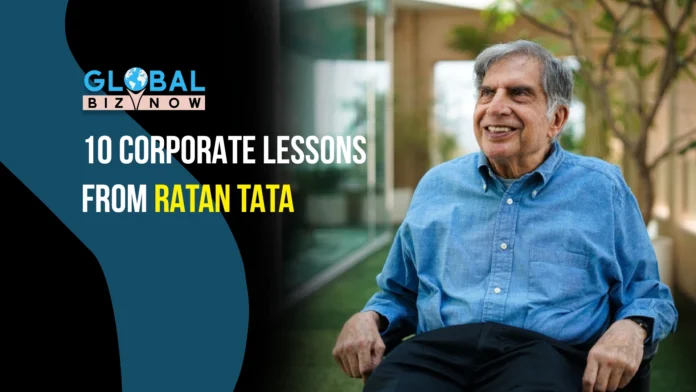Ratan Tata who was born on December 28, 1937, was Tata Sons’ past chairman. Under his guidance, the Tata Group’s parent company fought extensively through 1991 and 2012 to diversify and expand the Tata Group’s worldwide reach in the steel, consumer goods, automotive, and information technology industries. Ratan Tata’s legacy promotes corporate social responsibility, growth, innovation, and sustainable development.
Career and Business Leadership Lessons
Ratan Tata’s career speaks for the strength with which visionary leadership can be combined with a strong ethical foundation. Some of the lessons from his journey to the corporates are very valuable:
- Innovation: Ratan Tata believed in growth through innovation. Most significantly, he designed the Tata Indica, an automobile that was India’s first indigenously designed passenger car. The passenger car was released in 1998 after thorough research in order to cater to particular needs of the Indian consumer.The initiative marks a foray into the passenger vehicle space from Tata, where introducing novel offerings relevant to the local environment tells the story.
- Ethics and Responsibility: Ethics were the heart and soul of the leadership methodology pursued by Tata. Post the 2008 Mumbai attack,The group headed by Tata epitomized integrity in action through its actions. The staff of the Taj Mahal Palace Hotel placed guests’ safety, along with their own, ahead of everything and stood valiantly. Tata complimented the staff’s efforts, again replayed by the Group in commitment towards integrity and responsibility.
- Global Vision: Ratan Tata was highly perceptive about globalization. The acquisition of Jaguar Land Rover (JLR) back in 2008 by his leadership reflected this vision. It not only diversified the automobile portfolio of the Tata group but also established a prime presence in the luxury vehicle market, where the group’s global footprint actually improved.
- Culture of Empowerment:Tata believed in an empowerment culture for employees. Teams, under the Tata Business Excellence Model, innovated and improved on the operational process involved with their work. Accountability and ownership result in elevated morale and proficiency in operations.
- Sustainability and Social Responsibility: Ratan Tata’s corporate social responsibility commitment is reflected through the Tata Trusts, health care, education, and rural development; hence, the Tata Water Mission, a mission to provide clean drinking water to underdeveloped communities reflects a commitment for sustainability and wellbeing of the community.
- Flexibility to Change: The Group during times of economic slowdown showed the flexibility of Tata. At the time of the financial crisis in 2008, Tata clearly operated decisive restructuring steps directly aimed at its core businesses such as Tata Steel cutting costs and improving efficiency during the most crucial stages.
- Long-term vision: Long-term planning was emphasized and going for short-term profit was not in the minds of Ratan Tata. As a result, the growth in Tata Consultancy Services (TCS) came to be one of the leaders in IT services companies around the world. Technology and engineering required huge investment in research and development for engineers and Tata ensured TCS remained ahead in its field of operation.
- Customer-Centric Approach: The Tata company, on its part, found expression of customer needs through launching a small commercial vehicle called the Tata Ace. It fully satisfied the demand from markets asking for an affordable versatile transport solution. In summary, it had captured considerable market share while empowering thousands of small businessmen in India.
- Diversity and Inclusion: Ratan Tata was a proponent of diversity in the workplace. The Tata Group initiated and pursued programs in women’s leadership development. Diverse teams are believed to lead to higher quality decisions and innovation. This becomes a richer corporate culture across the Tata Group.
- Mentorship and Learning: Tata underlined mentorship, with the group of senior leaders that effectively mentored junior staff members, thus transferring knowledge and skills. It has led the Group through the turbulence in the marketplace with such adaptability.
The profile of Ratan Tata’s career and leadership provides invaluable lessons for businesses and individuals about visionary corporate stewardship. His commitment to ethical practices, innovation, and social responsibility has forever changed the face of corporates, proving that success is measured not only in terms of profit but also through a positive impact on society. Talent nurturing and inclusiveness cultures have been nurtured under Tata’s focus, which is essential to mobilizing teams towards collective success. The adaptability he navigated to handle challenges remains a clear reminder that resilience and foresight is, in today’s world, more seriously needed than ever. Ultimately, Ratan Tata inspired generations of leaders to always lead by integrity, compassion, and sustainability in the pursuit of their dreams, not forgetting the notion that true leadership is beyond the boardroom to the community that is being served.

